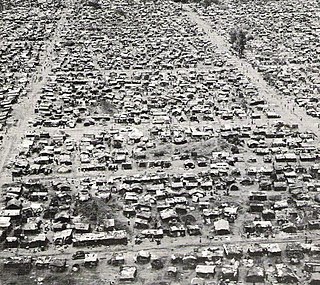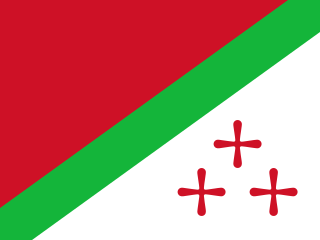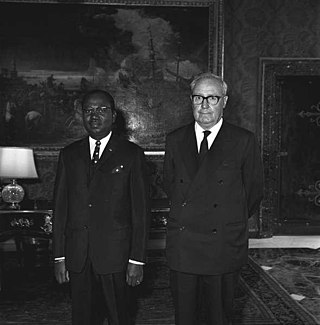Related Research Articles

Moïse Kapenda Tshombe was a Congolese businessman and politician. He served as the president of the secessionist State of Katanga from 1960 to 1963 and as prime minister of the Democratic Republic of the Congo from 1964 to 1965.

The Congo Crisis was a period of political upheaval and conflict between 1960 and 1965 in the Republic of the Congo. The crisis began almost immediately after the Congo became independent from Belgium and ended, unofficially, with the entire country under the rule of Joseph-Désiré Mobutu. Constituting a series of civil wars, the Congo Crisis was also a proxy conflict in the Cold War, in which the Soviet Union and the United States supported opposing factions. Around 100,000 people are believed to have been killed during the crisis.

Évariste Leon Kimba Mutombo, better known as Évariste Kimba, was a Congolese journalist and politician who served as Foreign Minister of the State of Katanga from 1960 to 1963 and Prime Minister of the Democratic Republic of the Congo from 13 October to 25 November 1965.

The State of Katanga, also known as the Republic of Katanga, was a breakaway state that proclaimed its independence from Congo-Léopoldville on 11 July 1960 under Moise Tshombe, leader of the local Confédération des associations tribales du Katanga (CONAKAT) political party. The new Katangese state did not enjoy full support throughout the province and was constantly plagued by ethnic strife in its northernmost region. It was dissolved in 1963 following an invasion by United Nations Operation in the Congo (ONUC) forces, and reintegrated with the rest of the country as Katanga Province.

The Belgo-Congolese Round Table Conference was a meeting organized in two parts in 1960 in Brussels between on the one side representatives of the Congolese political class and chiefs and on the other side Belgian political and business leaders. The round table meetings led to the adoption of sixteen resolutions on the future of the Belgian Congo and its institutional reforms. With a broad consensus, the date for independence was set on June 30, 1960.

Jason Sendwe was a Congolese politician and the founder and leader of the General Association of the Baluba of the Katanga (BALUBAKAT) party. He later served as Second Deputy Prime Minister of the Democratic Republic of the Congo from August 1961 until January 1963, and as President of the Province of North Katanga from September 1963 until his death, with a brief interruption.
Maurice Mpolo was a Congolese politician who served as Minister of Youth and Sports of the Republic of the Congo in 1960. He briefly led the Congolese army that July. He was executed alongside Prime Minister Patrice Lumumba in Katanga in 1961.

Isaac Kalonji Mutambayi was a Congolese Protestant minister and statesman who served as the President of the Senate of the Democratic Republic of the Congo from 1962 until 1965. He was one of the few politicians to serve the country continuously from its independence in 1960 until its democratisation in the 1990s.
Rémy Mwamba (1921–1967) was a Congolese politician who twice served as Minister of Justice of the Democratic Republic of the Congo. He was also a leading figure of the Association Générale des Baluba du Katanga (BALUBAKAT).

Benoît Verhaegen (1929–2009) was a Belgian academic and Africanist who specialised in the political sociology and post-colonial history of the Democratic Republic of the Congo.

Frédéric Vandewalle was a Belgian colonel and diplomat in the Belgian Congo and independent Congo. He was an influential figure right before and after Congo's independence from Belgium. He was one of the organisers of the Katangese secession and led Operation Ommegang against the Simba rebellion during the Congo Crisis. His precise role in the assassination of Patrice Lumumba is the subject of debate among historians.

Lucas Samalenge was a Congolese and Katangese politician who was Katanga's Secretary of State of Information.
Joseph Kiwele was a Congolese and Katangese musician and politician. He was Katanga's Minister of National Education and author of the state's national anthem, La Katangaise.
Albert Nyembo Mwana-Ngongo is a Congolese and Katangese politician who was a Secretary of State and Minister for Congo and secessionist Katanga.
Jean-Baptiste Kibwe Pampala Uwitwa was a Congolese-Katangese politician who was the Minister of Justice and Vice-President of the State of Katanga.
Chevalier Jacques Joseph Brassinne de La Buissière was a Belgian political scientist, author, and civil servant.

Jacques Masangu-a-Mwanza is a Congolese and Katangese politician and diplomat.
Etienne Ugeux (1923–1998) was a Belgian journalist.

Jacques Bartelous was a Belgian colonial civil servant who later became the Chef de cabinet of Moïse Tshombe, President of the unrecognized State of Katanga. Bartelous was born in the Brussels municipality of Forest in 1924. He was a volunteer in the Belgian army during the Second World War from December 1944 to October 1945 and received several distinctions for his participation in the war.
Salomon Tshizand (1913–1961) was a Congolese and Katangese politician.
References
- ↑ "Enquête parlementaire visant à déterminer les circonstances exactes de l'assassinat de Patrice Lumumba et l'implication éventuelle des responsables politiques belges dans celui-ci" (PDF). lachambre.be. Belgian Chamber of Representatives. 2001. p. 924. Retrieved 11 November 2021.
- ↑ "Le Busongye". 2011-03-27.
- ↑ Laporte, Jeroen (2017). HET BEDRIJFSMANAGEMENT VAN UNION MINIÈRE DU HAUT-KATANGA IN TIJDEN VAN DEKOLONISATIE (1955-1966) (PDF) (Thesis). pp. 60–1.
- ↑ Lemarchand, René (1964). Political Awakening in the Belgian Congo. Berkeley: University of California Press. p. 300.
- ↑ Hoedt, Eddy. "HET FRONT COMMUN ANTI-LUMUMBA IN ELISABETHSTAD EN IN BRUSSEL (11 JULI- 5 SEPTEMBER 1960)". Eddy's History Corner. Retrieved 2021-11-11.
- ↑ Jean Omasombo Tshonda, ed. (2018). Haut-Katanga: Lorsque richesses économiques et pouvoirs politiques forcent une identité régionale. Tome 1: Cadre naturel, peuplement et politique (PDF). Africamuseum. p. 349.
- ↑ U.S. Army Area Handbook for the Republic of the Congo (Leopoldville). 1962. p. 357. 357
- ↑ Weber, Guy (1983). Le Katanga de Moïse Tshombe ou le drame de la loyauté. Brussels: Éditions Louis Musin. p. 201. ISBN 2-87083-013-0.
- ↑ "Enquête parlementaire visant à déterminer les circonstances exactes de l'assassinat de Patrice Lumumba et l'implication éventuelle des responsables politiques belges dans celui-ci" (PDF). Belgian Chamber of Representatives. 16 November 2001. pp. 764–766. Retrieved 11 November 2021.
Entre 20h30 heures et 20h45, ce convoi s'est rendu à l'endroit où l'exécution devait avoir lieu, à plus ou moins soixante kilomètres de la ville. L'endroit avait, manifestement, été préparé à l'avance : une fosse avait déjà été creusée. Les prisonniers ont été placés devant cette fosse. Un policier désigné à cette fin les a abattus un par un, et ils sont ensuite tombés dans la fosse. Kibwe a assisté à ces événements.
- ↑ "Enquête parlementaire visant à déterminer les circonstances exactes de l'assassinat de Patrice Lumumba et l'implication éventuelle des responsables politiques belges dans celui-ci" (PDF). Belgian Chamber of Representatives. 16 November 2001. p. 766. Retrieved 11 November 2021.
- ↑ Passemiers, Lazlo (2019). Decolonisation and Regional Geopolitics: South Africa and the 'Congo Crisis', 1960-1965. Routledge. ISBN 9781351138147.
- ↑ "Gabriel Kitenge, le retour à la source!". 2007-10-15.
- ↑ "Gabriel Kitenge, le retour à la source!". 2007-10-15.
- ↑ "Gabriel Kitenge, le retour à la source!". 2007-10-15.